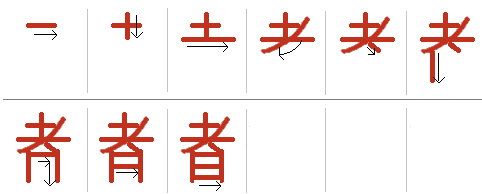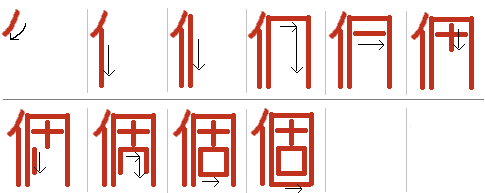Click here for a PDF copy of all our Hanja lessons.
In this lesson, you will learn five characters that relate to people or individuals.
—————————–—
者 = 자 = People who do
(Korean name: 놈 자)
This character is often placed after a noun to indicate a person that “does” what the noun describes. For example, “과학” means “science but “과학자” means scientist. “연구” means “research” but “연구자” means “researcher.” There are many words that follow this pattern.
Common Words using this Character:
學者 = scholar
化學者 = chemist
事業者 = business person
數學者 = mathematician
信者 = believer
과學者 = scientist
勤로者 = worker/laborer
노동者 = worker/laborer
살人者 = murderer
代표者 = representative
同반者 = companion 거주者 = resident
기술者 = technician
담당者 = person in charge
연구者 = researcher
운전者 = driver
피해者 = victim
—————————–—
士 = 사 = Scholar
(Korean name: 선비 사)
Often used to denote that one is an “expert” or “scholar” in a particular field.
Common Words using this Character:
學士 = a bachelor’s degree (or someone who holds it)
박士 = a doctorate degree (or someone who holds it)
기士 = driver (high respect)
운전士 = driver
변호士 = lawyer
신士 = gentleman
人士 = important/famous person
會계士 = accountant
—————————–—
自 = 자 = oneself
(Korean name: 스스로 자)
Common Words using this Character
自信 = self-confidence/trust
自身 = oneself
自體 = itself
自기 = oneself
自동 = automatic
自동차 = car/automobile
自살 = suicide
自연 = nature
自유 = freedom
—————————–—
個 = 개 = single, unit, piece
(Korean name: 낱 개)
In addition to finding this character in words like “personal,” 個 is the Hanja character for the Korean counter “개” when counting things. You can learn about this in Lesson 10 of our Korean lessons.
Common Words using this Character
個 = a counter for “things”
個人 = personal
個月 = a counter for months
個國 = counter for countries
個성 = personality
—————————–—
主 = 주 = Master, main
(Korean name: 임금 주, 주인 주)
主 is used in words to indicate that something is the “main” form of something. I included this character in this lesson because of its use in the word 主人, which refers to the “main person” or owner/proprietor of a house/building/business.
 Common Words using this Character:
Common Words using this Character:
主人 = owner
公主 = princess
民主 = democracy
主食 = staple food (like rice)
主人公 = main character in a story
主제 = subject, main theme
主로 = mostly, mainly
You can also find this character in words with “주의,” which is often combined with nouns to add the meaning of “~ism” to that noun. For example, 자본 refers to “capital,” but 자본주의 refers to “capitalism. Likewise, 사회 refers to “society,” but 사회주의 refers to “socialism.” For example:
個人主의 = individualism
共산主의 = communism
民主主의 = democracy (..ism)
사會主의 = socialism
人本主의 = humanism
제國主의 = imperialism
自유主의 = liberalism
비관主의 = pessimism
객관主의 = objectivism
者, which you learned earlier in this lesson, is often added to these “~ism” words to indicate a person who does that type of thing. This usually changes the word to end in “~ist.” For example:
個人主의者 = individualist
共산主의者 = communist
民主主의者 = democrat
사會主의者 = socialist
人本主의者 = humanist
제國主의者 = imperialist
自유主의者 = liberalist
비관主의者 = pessimist
객관主의者 = objectivist
That’s it for this lesson!
Okay, I got it! Take me to the next lesson!
Click here for a PDF copy of all our Hanja lessons.





